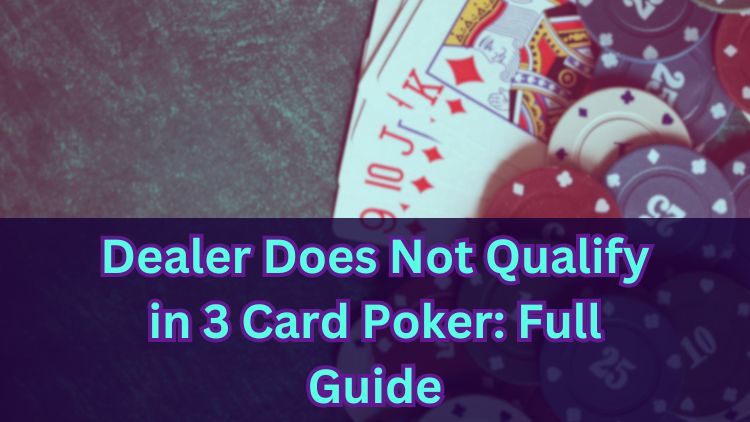
Have you ever found yourself at a casino table or playing online, coming across the phrase “dealer does not qualify” in 3 Card Poker, and wondered what it actually means? It can feel a bit unclear at first, especially if you are new to the game.
This guide explains the idea without any complicated jargon, shows how it affects your bets, and points out where online versions might handle it slightly differently. By the end, you will hopefully know exactly what is happening when the dealer fails to qualify and what that means for your potential chips. Read on to learn more.
What Does “Dealer Does Not Qualify” Mean in 3 Card Poker?
In 3 Card Poker, “dealer does not qualify” refers to whether the dealer’s hand reaches a minimum standard. You and the dealer each receive three cards. For the dealer to qualify, their hand must usually be Queen-high or better. That means the highest card must be at least a Queen. If their best card is a Jack or lower, and they do not have a pair or stronger, the dealer does not qualify.
This rule helps balance the game, rather than every round simply coming down to who has the higher hand. Online versions can set small variations on the exact threshold, so it is worth checking the in-game rules screen. UK Gambling Commission (UKGC)-licensed casinos publish these details clearly in the help or paytable section.
If you do decide to try your hand at poker, remember to do so responsibly and within your means; never wager more than you can afford to lose.
How Dealer Qualification Works in 3 Card Poker
Each round, the dealer’s hand is compared against a minimum standard. Any hand of Queen-high or better is considered qualified. That includes Ace-high, King-high and all hands with a pair or stronger. Hands that top out at Jack-high or lower without a pair do not qualify.
In practice, the dealer qualifies most of the time, at around seven hands out of ten. That frequency matters because it shapes how your Ante and Play bets are settled over many rounds. If the dealer qualifies, your hand is compared directly against theirs.
When Does the Dealer Qualify and When Do They Not?
The dividing line is simple. Any Queen-high or better hand qualifies. Any Jack-high or lower without a pair does not. A few quick examples bring it to life:
- Q-7-2 qualifies, because the highest card is a Queen.
- A-3-2 qualifies, because Ace-high is above the threshold.
- 10-9-6 does not qualify, because it is only Ten-high.
- J-9-8 does not qualify, because it is Jack-high.
- 2-2-7 qualifies, because any pair qualifies.
If you are ever unsure, the game’s help screen shows the exact threshold used.
What Happens to Your Bet if the Dealer Does Not Qualify?
In 3 Card Poker, the main wagers are the Ante and the Play bet. When the dealer does not qualify, the handling of these two bets changes compared with a fully contested round. If you have stayed in the hand, your Ante wins at even money and your Play bet is returned to you. It is a push on the Play, so you neither win nor lose on that part.
If you placed a Pair Plus side bet, it is settled on your cards alone, so dealer qualification makes no difference to it. The side bet either pays or loses based on the paytable, regardless of the dealer’s hand.
If you had already folded before the reveal, the outcome was decided at that point and the dealer’s qualification status does not come into play.
How Payouts Work When the Dealer Does Not Qualify
When the dealer does not qualify, the settlement is straightforward. As noted above, the Ante is paid at 1 to 1 and the Play bet is pushed back to you. That part is automatic and does not require the dealer to meet any threshold.
Side bets and bonuses are handled separately:
Pair Plus pays only on the strength of your three cards. Higher-ranking hands return more, but the exact amounts can vary between games. The paytable in the game window shows the precise payouts for a pair, flush, straight, three of a kind and straight flush. For example, if you hold a flush, your Pair Plus is paid according to that paytable whether or not the dealer qualifies.
Some games also include an Ante Bonus for strong hands, often starting at a straight or better. This bonus is awarded even when the dealer does not qualify, and it is paid on top of the standard Ante outcome. Always keep responsible gambling practises in mind.
**The information provided in this blog is intended for educational purposes and should not be construed as betting advice or a guarantee of success. Always gamble responsibly.
*All values (Bet Levels, Maximum Wins etc.) mentioned in relation to these games are subject to change at any time. Game features mentioned may not be available in some jurisdictions.
